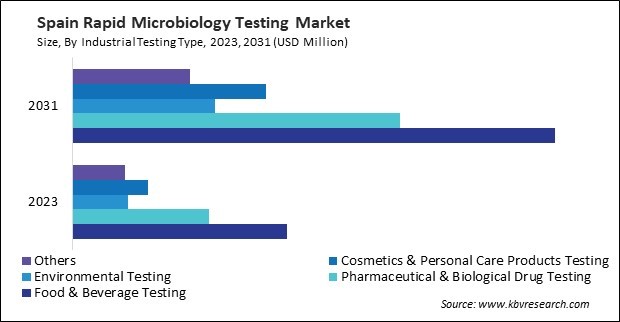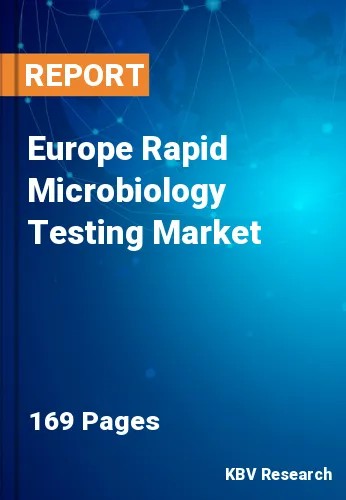The Europe Rapid Microbiology Testing Market would witness market growth of 10.1% CAGR during the forecast period (2024-2031).
The Germany market dominated the Europe Rapid Microbiology Testing Market by Country in 2023, and would continue to be a dominant market till 2031; thereby, achieving a market value of $647.8 million by 2031. The UK market is exhibiting a CAGR of 9.1% during (2024 - 2031). Additionally, The France market would experience a CAGR of 11% during (2024 - 2031).

Integrating artificial intelligence (AI) and machine learning (ML) algorithms into the testing platforms revolutionizes data analysis and interpretation. AI-driven software solutions can analyze complex patterns of test results, predict antimicrobial susceptibility profiles, and identify emerging microbial threats with unprecedented speed and accuracy. By harnessing the power of AI and ML, rapid testing technologies can enhance diagnostic accuracy, optimize treatment algorithms, and facilitate real-time decision support for healthcare providers.
Furthermore, multiplexed assays capable of simultaneously detecting multiple pathogens or genetic markers in a single test are gaining prominence in the market. Syndromic panels targeting specific clinical syndromes, such as respiratory infections, gastrointestinal illnesses, or bloodstream infections, enable comprehensive testing for various pathogens associated with specific disease presentations. These multiplexed testing solutions offer enhanced diagnostic yield, streamline laboratory workflows, and improve turnaround times for infectious disease diagnostics.
As per the data from the Government of the United Kingdom, in terms of gross value added (GVA), beverages was the largest manufacturing category with a value of £6.5 billion in 2021. It contributed 21.4% to the total food and drink manufacturing GVA. The other food products category was the second largest, valued at £6.3 billion in the same year, contributing 20.6% to the total food and drink manufacturing GVA. In addition, as per the data from the International Trade Administration, Belgium’s pharmaceutical industry spends $1.64 billion (€1.5 billion) on R&D every year, which is equivalent to 40 percent of all private investment made in Belgium. As a result, Belgium is home to 29 of the world’s top 30 pharmaceutical companies, including important subsidiaries of major U.S. companies such as Johnson & Johnson and Pfizer. Thus, Europe's growing pharmaceutical and food & beverage sectors will drive the expansion of the regional market.
Free Valuable Insights: The Global Rapid Microbiology Testing Market will Hit USD 10.4 Billion by 2031, at a CAGR of 10.5%
Based on Method, the market is segmented into Growth-based Rapid Microbiology Testing, Cellular Component-based Rapid Microbiology Testing, Nucleic Acid-based Rapid Microbiology Testing, Viability-based Rapid Microbiology Testing and Others. Based on Application, the market is segmented into Industrial Testing (Food & Beverage Testing, Pharmaceutical & Biological Drug Testing, Environmental Testing, Cosmetics & Personal Care Products Testing and Others), Clinical Disease Diagnosis and Research Applications. Based on Product, the market is segmented into Instruments (Automated Microbial Identification & Antimicrobial Susceptibility Testing Systems, Mass Spectrometers, PCR Systems, Bioluminescence & Fluorescence-based Detection Systems, Cytometers, Active Air Samplers and Others), Reagents & Kits, and Consumables. Based on countries, the market is segmented into Germany, UK, France, Russia, Spain, Italy, and Rest of Europe.
By Method
By Application
By Product
By Country
Our team of dedicated experts can provide you with attractive expansion opportunities for your business.

